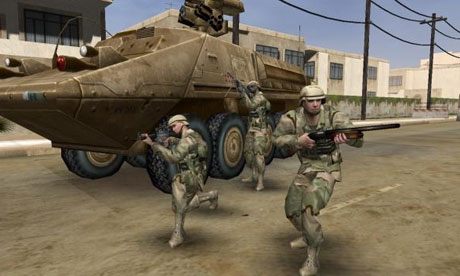The Guardian has a good story on Are video games just propaganda and training tools for the military?. Despite the title, the story doesn’t really take sides. It documents the variety of ways that game companies and armies interact from companies like Kuma Games that make Kuma\War games out of current events. The article also links to an interesting grant award to Kuma from the Department of Defense for game-based second language training:
Utilizing our tools, experience, and huge library of existing 3D assets we can provide an effective, cost-efficient, rapidly-deployable and easily updatable language retention toolset for trainers and Soldiers deployed around the world. It is our intention to refresh languages skills in an intense and immersive 3D environment, which would be made available as part of an online/offline language exercise portal …
The article also documents games made from an Arab perspective by companies in Syria, developers tied to the Hezbollah and Irani organizations. These games (whether the Kuma\War games or those from other perspectives) can be seen as soft propaganda – making normal attitudes about who is good and bad. Such games don’t train people the way simulators might, but they can recruit people or legitimize a cause.
One could argue that just as in the Cold War the “soft power” of American movies played a key role, so in the percieved conflict with terrorism software is playing a similar propaganda role. The problem may be that the wrong people are being portrayed as the bad guys. The propaganda on both sides may be too crude and may make reconciliation harder.
In the meantime Iran has sentenced one of the Kuma designers to death accusing him of developing for the CIA. The game gets serious for this poor designer who was detained when he visited family in Iran.
